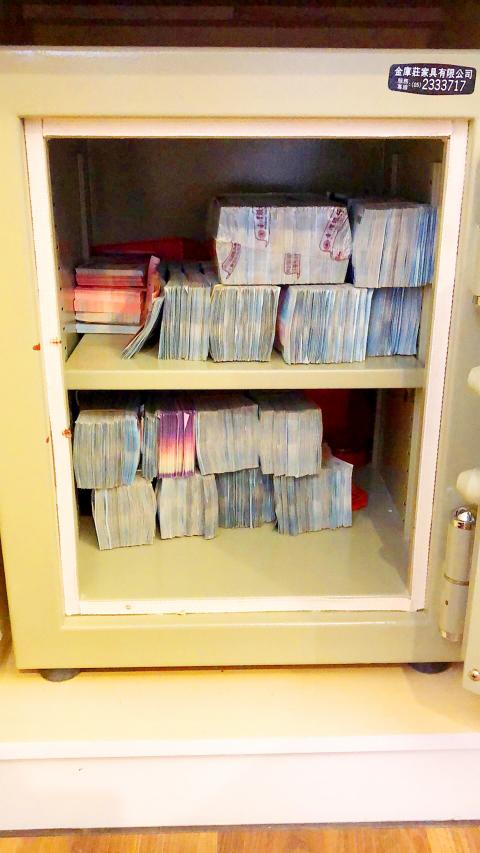A Chiayi couple who had been detained as suspects in an illegal remittance ring that reportedly transferred NT$8 billion (US$255.05 million at the current exchange rate) between Taiwan and China over one year, were yesterday released by a bail court judge due to procedural errors.
The husband and wife were on Tuesday detained by prosecutors and Investigation Bureau officers in raids in Chiayi and Taipei, and taken in for questioning on suspicion of contravening the Banking Act (銀行法), the Chiayi District Prosecutors’ Office said.
Officers confiscated NT$240 million in wrapped bundles of cash, prosecutors said.

Photo: Wang Shan-yen, Taipei Times
The man, surnamed Wu (吳), allegedly set up an “underground bank” for providing money transfers and remittance services, as many Taiwanese companies doing business in China need such services, they said, adding that Wu had savings and cross-strait experience from managing a trading company with offices in Taiwan and China, and in late 2017 started his own banking operation.
Analyzing Wu’s accounting ledgers and records showed that he had conducted NT$8 billion in money transfers and remittances, with his operation attracting clients by offering better exchange rates than legal banks, they added.
The prosecutors said they applied yesterday to have the couple detained, pending the investigation, and their communication restricted, citing a risk of flight, possible collusion with suspects and tampering with evidence.
However, the judge rejected the prosecutors’ arguments and released the couple without bail, saying that there was a lack of evidence and possible procedural errors.
“The raids were conducted in the morning, with prosecutors searching the couple’s residences and storage areas. Then, with the couple’s consent, they were taken to the local Investigation Bureau office for questioning,” Chiayi District Court spokesperson Hung Chia-lan (洪嘉蘭) said.
“Later in the afternoon, prosecutors uncovered a large amount of cash at a house belonging to the wife’s family. After tallying up the amount, prosecutors considered the seized money as loot or illegal gain related to a criminal case, and ordered the couple’s arrest, in compliance with procedures in the Criminal Code,” Hung said.
The couple had restricted movement for several hours when beign questioning, Hung said.
“The prosecutors had not established a connection between the seized money and the couple’s alleged illegal money transfers,” Hung added. “The evidence presented thus far has been unable to prove that the money represented illegal gains resulting from their breaching the Banking Act.”

US climber Alex Honnold is to attempt to scale Taipei 101 without a rope and harness in a live Netflix special on Jan. 24, the streaming platform announced on Wednesday. Accounting for the time difference, the two-hour broadcast of Honnold’s climb, called Skyscraper Live, is to air on Jan. 23 in the US, Netflix said in a statement. Honnold, 40, was the first person ever to free solo climb the 900m El Capitan rock formation in Yosemite National Park — a feat that was recorded and later made into the 2018 documentary film Free Solo. Netflix previewed Skyscraper Live in October, after videos

NUMBERS IMBALANCE: More than 4 million Taiwanese have visited China this year, while only about half a million Chinese have visited here Beijing has yet to respond to Taiwan’s requests for negotiation over matters related to the recovery of cross-strait tourism, the Tourism Administration said yesterday. Taiwan’s tourism authority issued the statement after Chinese-language daily the China Times reported yesterday that the government’s policy of banning group tours to China does not stop Taiwanese from visiting the country. As of October, more than 4.2 million had traveled to China this year, exceeding last year. Beijing estimated the number of Taiwanese tourists in China could reach 4.5 million this year. By contrast, only 500,000 Chinese tourists are expected in Taiwan, the report said. The report

Temperatures are forecast to drop steadily as a continental cold air mass moves across Taiwan, with some areas also likely to see heavy rainfall, the Central Weather Administration (CWA) said. From today through early tomorrow, a cold air mass would keep temperatures low across central and northern Taiwan, and the eastern half of Taiwan proper, with isolated brief showers forecast along Keelung’s north coast, Taipei and New Taipei City’s mountainous areas and eastern Taiwan, it said. Lows of 11°C to 15°C are forecast in central and northern Taiwan, Yilan County, and the outlying Kinmen and Lienchiang (Matsu) counties, and 14°C to 17°C

STEERING FAILURE: The first boat of its class is experiencing teething issues as it readies for acceptance by the navy, according to a recent story about rudder failure The Hai Kun (海鯤), the nation’s first locally built submarine, allegedly suffered a total failure of stern hydraulic systems during the second round of sea acceptance trials on June 26, and sailors were forced to manually operate the X-rudder to turn the submarine and return to port, news Web site Mirror Daily reported yesterday. The report said that tugboats following the Hai Kun assisted the submarine in avoiding collisions with other ships due to the X-rudder malfunctioning. At the time of the report, the submarine had completed its trials and was scheduled to begin diving and surfacing tests in shallow areas. The X-rudder,